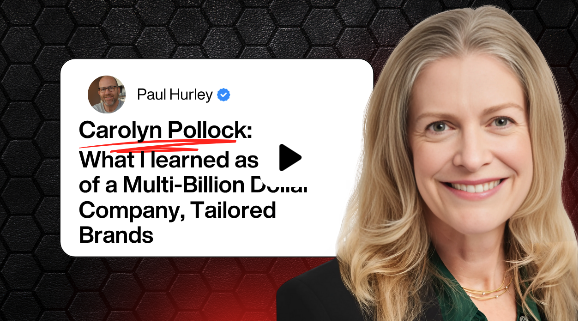Leading Through Change: Lessons from Carolyn Pollock, Former CMO of Tailored Brands



In our All Dots Connected podcast, Carolyn Pollock — former CMO at Tailored Brands (Men’s Wearhouse, Joseph Abboud, Moores) — shared her perspective on the evolving role of marketing leaders. From balancing analytics with brand building to leading teams through transformation, her lessons are deeply relevant for CMOs navigating today’s complex, data-driven world.
“Everything you do has to have some level of alignment with performance, or people aren’t going to want to continue doing it.”
Carolyn reminds us that creative ideas only earn long-term trust when they connect to measurable business outcomes. In every transformation she’s led, she’s worked to link marketing metrics back to financial results — often by reconciling attribution and mix models directly with the P&L.
For CMOs: Build a measurement system that the finance team believes in. When marketing shows up consistently in the P&L, the conversation shifts from justification to strategy.
“All attribution is wrong by its nature. It’s about triangulation — finding something consistent enough to use for decision-making.”
At Tailored Brands, Carolyn’s team used a layered approach — blending media mix modeling (MMM), multi-touch attribution (MTA), and real-world incrementality tests. The goal wasn’t to find one “perfect” model but to create consistent signals that informed smarter spending.
For CMOs: Don’t chase perfect attribution. Build a flexible, consistent system that triangulates truth across methods — and connects back to business outcomes.
Pollock’s second round of MMM success came from a simple but powerful change: inviting finance to help build the model, not just review the results.
“Having finance leaders participate in defining assumptions and metrics made a massive difference in engagement and trust.”
For CMOs: Transparency creates alignment. Involve finance in the model design phase so they understand not just what it says, but how it works.
“There will be people who aren’t ready to ride the ride the entire way.”
Organizational transformation requires hard calls. For Carolyn, success came from honest assessments — identifying who has the skill and appetite to adapt, and moving decisively when the fit isn’t right.
For CMOs: The hardest part of transformation isn’t the strategy — it’s the people. Act quickly and compassionately to build a team that’s ready for the next chapter.
During the pandemic, Tailored Brands had to sell suits when “no one was going to the office, getting married, or attending events.” The answer: focus relentlessly on what could be controlled — contracts, agencies, shoots, and spend efficiency.
“We went line by line through every budget, turning non-working dollars into media that kept our voice out there.”
For CMOs: When macro conditions shift, micro-optimizations compound. Empower teams to find efficiency in what they can control.
Pollock argues that analytics should be dedicated — if not directly reporting into marketing, then fully aligned.
“Analytics is one of the most prized resources in a company. If it’s enterprise-shared, you may not get the support or speed you need.”
For CMOs: Whether on your org chart or not, make sure analysts understand marketing’s tempo. The cadence of inquiry is faster in marketing than in most other functions — and speed drives ROI.
“We’re moving from specialists back to generalists. With GenAI, the differentiator will be context — understanding how all the parts fit together.”
Pollock predicts that the next generation of marketers will win not by going deeper in one discipline, but by becoming “quarterbacks” who understand creative, data, brand, and technology — and can speak the language of finance and AI alike.
For CMOs: Encourage your teams to cross-train. Pair creatives with analysts, brand strategists with technologists. Context and collaboration will define the next era of marketing leadership.
“The one thing AI can’t replace is understanding people — their emotions, motivations, and why they do what they do.”
Pollock closes with a reminder that even as AI reshapes how marketing operates, the heart of it - connecting with humans - remains unchanged.
For CMOs: Use AI to accelerate insight, not replace empathy. The brands that win will combine data, technology, and human understanding to stay relevant in an unpredictable world.
Carolyn Pollock’s journey shows what modern marketing leadership looks like: part data scientist, part change manager, part human connector. Her advice for today’s CMOs? Be curious. Be transparent. Lead with context. And never lose sight of the people behind the numbers.
